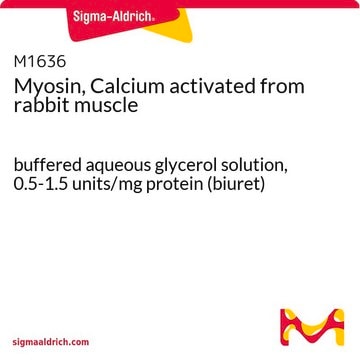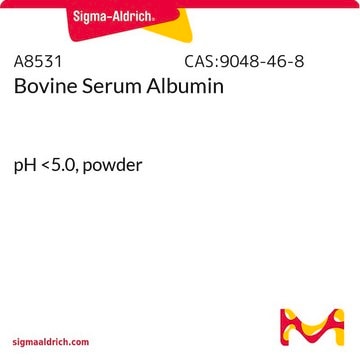A7906
Bovine Serum Albumin
heat shock fraction, pH 7, ≥98%
Synonym(s):
Albumin bovine serum, BSA, Bovine albumin
About This Item
Recommended Products
biological source
bovine
Quality Level
Assay
≥98%
form
lyophilized powder
mol wt
~66 kDa
purified by
heat shock fractionation
packaging
poly bottle of
origin
USA origin
technique(s)
blood typing: suitable
microbiological culture: suitable
impurities
≤5.0% Loss on drying
loss
≤5%
pH
7
solubility
water: soluble (40 mg/ml)
UniProt accession no.
foreign activity
BT virus, none detected
VSV virus, none detected
storage temp.
2-8°C
Gene Information
bovine ... ALB(280717)
Looking for similar products? Visit Product Comparison Guide
Related Categories
Application
- as a component of PCR (polymerase chain reaction) mix
- in the preparation of dissociated cortical neurons
- during immunofluorescent labeling
- as a component of Ca2+-free saline (containing collagenase, hyaluronidase and DNAse) used for bovine tissue digestion
Biochem/physiol Actions
Preparation Note
also commonly purchased with this product
recommended
suggested gloves for splash protection
Storage Class Code
11 - Combustible Solids
WGK
WGK 1
Flash Point(F)
Not applicable
Flash Point(C)
Not applicable
Personal Protective Equipment
Choose from one of the most recent versions:
Certificates of Analysis (COA)
Don't see the Right Version?
If you require a particular version, you can look up a specific certificate by the Lot or Batch number.
Already Own This Product?
Find documentation for the products that you have recently purchased in the Document Library.
Customers Also Viewed
Our team of scientists has experience in all areas of research including Life Science, Material Science, Chemical Synthesis, Chromatography, Analytical and many others.
Contact Technical Service





